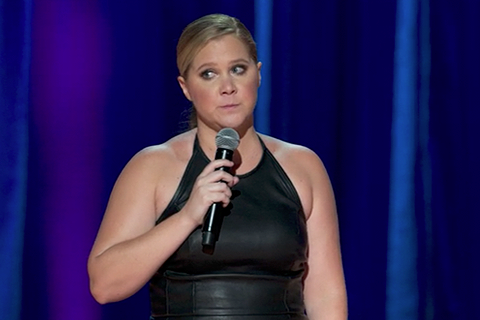Sign up to stay in the loop on new styles and sales!
Sign up to stay in the loop on new styles and sales!
On The Invisible Burden We Bear For Prince Charming
thinx archive
·5 min read

by Emma Glassman-Hughes | 08/25/2016
Amy Schumer: The Leather Special, Netflix
Bitch Media, a real gift of a site BTW, put out an article this week about something close to my heart. And while, at its center, the piece offered some excellent insight, it carried a title that rubbed me in all kinds of wrong ways, despite it’s aces film ref: “One Angry Man: Amy Schumer’s Kurt Metzger Problem.”
I’m not prepared to put the ugliest name in comedy and the face of rape culture on Amy’s back just yet. (Click here for a catch-me-up on the whole UCB/Aaron Glaser/Kurt Metzger issue if you need it).
While I agree that Metzger shouldn’t have been able to touch Inside Amy with a 40-foot pole, I’m not sure it’s fair for commentators to pretend like we know the whole situation, and potentially overlook the details that would keep Amy Schumer--a survivor of sexual abuse herself--in a friendship with someone as vile as Kurt Metzger. I admit, the unveiling of more details behind their relationship certainly has me upset that she has chosen to maintain ties with him, either personal or professional. I hope that if it were me in her situation, I would have no hesitation about cutting him out of my life. I’m just not all that convinced that, in her shoes, we’d be the feminist hero we’re all desperately craving. That’s not how we’re conditioned to act.
What many people fail to understand is just how frequently some women are faced with Kurt Metzgers. I go to a school full of them. Boys who are wickedly funny, who like to test boundaries, who use humor to cope with how much they hate themselves or hate things that have happened to them, and who can go from charming to scary dark at the drop of a hat, or the slug of a tequila shot. They’re manipulative, and through their charisma, they collect their most prized tool--sympathy--like dust; until someone stirs them and in turn clouds the air and plugs up airways. I know from experience what it’s like to make excuses in my mind for the behavior of some of these boys--”he’s been through a lot,” “he doesn’t know better,” “he was just kidding,” “it’s okay because he really likes me, he thinks I’m funny”--when their behavior has hurt me or those around them.
Women have been taught since girlhood that we need to learn how to take a joke. We’ve been taught that if we have a problem with a boy--if he hurt our feelings--it’s because we’re being too sensitive, or we don’t have enough of a sense of humor. I personally recognize in myself how much energy I’ve expended trying to disprove this, by instead proving myself as a funny girl, a girl who can laugh it off, a girl who’s one of the guys because she can joke like a guy. I still recognize a sense of victory within myself when I’m able to make a guy laugh. It’s unsettling to realize how much it feels like I’ve won an award when I get attention from a known funny boy at school, either friendly or romantic. That feeling of validation is addictive, and it’s not something we easily relinquish.
I’ve seen friends of mine--friends who on any other day of the year would claim to stand against gendered violence and male entitlement--blatantly protect their male friends (sometimes subtly, sometimes blatantly) who have hurt girls they know. I’ve watched groups of popular friends ignore that one of theirs was assaulted while she was at a party by another member of the group. I’ve watched fraternities and sororities quietly rally behind their accused brothers and against women who have done the accusing. I’ve personally forgiven or excused bad sexual behavior from well-known and well-liked boys. All of these examples are explained away because women are too afraid that we’re being overdramatic or that we can’t just take a joke.
Funny, popular men are put on pedestals and we, collectively, have a hard time taking them down. It’s not just Amy Schumer, it’s everyone who has apologized for or continued to work famous abusers. Because I don’t know her, I don’t know if Amy can relate to any of this. And maybe this piece isn’t even about Amy Schumer at all. However, I do know that the desire for approval from powerful or charismatic men is real, and leads too many women to wrestle their feelings in an effort to protect male egos and reputations.
Holding charming or funny men to their responsibilities isn’t easy. Amy Schumer should be expected to do it, she’s a public figure after all, but the issue isn’t her own. This kind of behavior is still a symptom of rape culture, even though the shape it takes is less recognizable.
by Emma Glassman-Hughes


